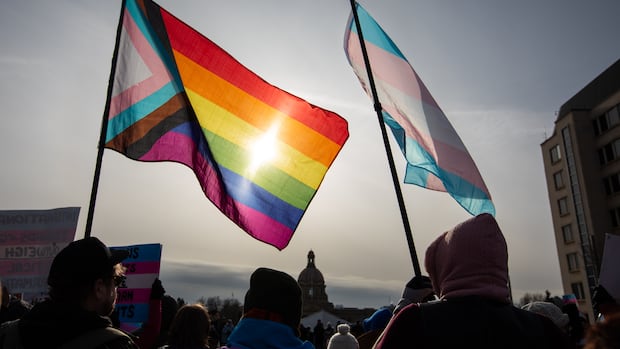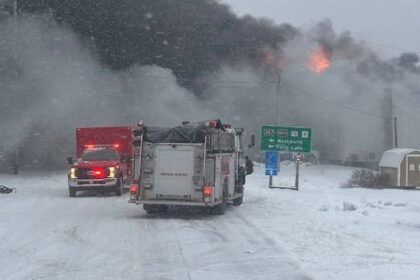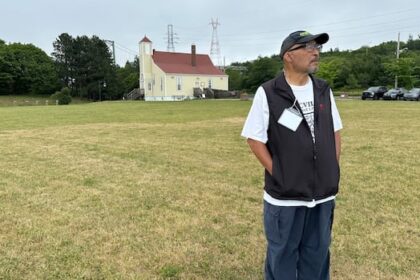When a government invokes the notwithstanding clause, like Alberta’s just did on three transgender policy bills, it doesn’t need to specify which rights within the Charter of Rights and Freedoms its legislation needs an exemption from.It could be any or all of the 10 Charter sections the constitution permits a provincial or federal government to act notwithstanding of. If that legislature invokes it, there’s no way anybody who feels that specific government policy violated their rights can get it overturned in court.This broad exemption from Charter rights, used sparingly in Alberta over the 43 years of the notwithstanding clause’s existence, is being invoked for the second, third and fourth time within a month, following Premier Danielle Smith’s wielding of it to end the teachers’ strike.But Albertans can understand which Charter rights one of the laws the government’s restrictions on gender-affirming surgery and treatment for teens might have violated.Albertans know because a Court of King’s Bench justice told us so in her ruling whose injunction blocked the ban from taking effect on gender dysphoric young people living in this province.Justice Allison Kuntz delivered an interim ruling in favour of five gender diverse youth and the advocacy groups that challenged the law’s constitutionality, granting their injunction and concluding that a trial should be held on whether the government’s ban violated Section 7 (the right to life, liberty and security of the person) and Section 15 (equal protection and equal benefit of the law without discrimination).Regarding the youths’ Section 7 rights, Kuntz wrote: “I find there is a serious issue to be tried in respect of whether the ban will have a serious and profound effect on the psychological integrity of transgender and gender diverse youth by preventing and/or unduly limiting their access to health care … and their having to experience the consequences of that limitation (e.g. high levels of depression/anxiety and irreversible changes to their bodies, discrimination), and by denying them autonomy over their bodies.”On the equal protection section, the justice found “there is a serious issue to be tried in respect of whether the ban will adversely impact gender diverse youth in a manner that perpetuates disadvantage and prejudice by denying them access to medically indicated treatment that remains available to others, thereby prolonging or worsening gender dysphoria, distress, prejudice, and mental health challenges of gender diverse youth.”That’s just the health law.Until this autumn, the notwithstanding clause was only used in Alberta for a 1998 bill that the Tory government withdrew, and a backbencher’s 2000 private member’s bill on same-sex marriage. This year, the Smith government has invoked it on four laws within a month. (Scott Neufeld/CBC)While the law restricting transgender women in women’s sport was not taken to court, another challenge was brought this fall against the restrictions on teens changing their pronouns in school.That claim alleged the law violated Sections 7 and 15, as well as 12 (the right to be free from cruel and unusual treatment).As these laws were introduced and then enacted — over the protests of medical professionals, teachers, 2SLGTBQ+ support groups and others — Smith was asked repeatedly about the constitutionality of her trans policy reforms.Repeatedly, she expressed confidence the laws could withstand Charter challenges.WATCH | Advocate calls Alberta’s trans health law medical ‘overreach’ :Advocate calls Alberta’s trans health law medical ‘overreach’Bennett Jensen, director of legal at Egale Canada, says the tabling of Bill 9 in Alberta means ‘a government acted for the first time in Canadian history to use the notwithstanding clause to limit access to health care.’ Bill 9 invokes the clause to shield three transgender-related bills from court challenges — a move that Jensen calls ‘chilling.’“The Charter allows for limits on rights that are reasonable in a free and democratic society. We think what we’re putting forward is reasonable,” Smith said when tabling the bills in October.“We’re going to argue that we’re being reasonable, proportionate and evidence-based, and we’ll see how it goes in court,” she said last December, after the health-care ban was passed and then challenged. Even after Kuntz granted the injunction against the health bill, Smith maintained belief in her laws’ constitutional soundness. “The court had said that they think that there will be irreparable harm if the law goes ahead. I feel the reverse,” she told her weekend radio show in June.”We want to battle this out, and the way you do that is you go to the higher levels of court. If we were to impose the notwithstanding clause, everything would stop. We actually think that we’ve got a very solid case.” Alberta appealed the injunction in July.Throughout these defences of her case, Smith never ruled out using the constitution’s nuclear option, but often cited it as a “last resort.”What changed from then to now, with Bill 9 applying the notwithstanding clause to not only exempt her laws from the rights in the Charter, but also the Alberta Human Rights Act and the Alberta Bill of Rights, which Smith proudly fortified last year?It wasn’t the initial court setback, Justice Minister Mickey Amery insisted in a briefing about the notwithstanding clause’s triple invocation. “We were very confident in our position,” he told reporters.“We always have been. We always will be, but there is a process in place that can take years to resolve.”In a counter to the “irreparable harms” that Kuntz had said the trans health bill risked causing to youth, Smith and Amery spoke of the harms and risks if young Albertans make life-altering health decisions they’d live to regret while the courts spent years in appeals and challenges.“While invoking it, we’re keeping these decisions in the hands of those who are directly accountable to Albertans [that is, the government], and ensuring these protections can move forward without further court delay or uncertainty,” Smith told reporters.Alberta Premier Danielle Smith and Minister of Justice Mickey Amery make their way to announce proposed changes to several pieces of democratic process legislation in Edmonton on April 29, 2025. (Jason Franson/The Canadian Press)The Alberta government knows that court challenges can stretch over several years — just look at all the federal challenges it’s embarked on or joined.And the risk that the province’s measures could be challenged and then temporarily blocked has precedent next door in Saskatchewan. In fall 2023, Premier Scott Moe’s government had its pronouns policy delayed by a judge’s injunction, and it swiftly invoked the notwithstanding clause to circumvent that court process.It’s possible that the Alberta government could have pre-empted challenges to the laws by attaching the notwithstanding clause to them when they were introduced last year. That’s the route Quebec has taken with many controversial laws on language and religious expression, as well as the approach Smith took with her government’s teacher-strike-ending legislation.Observers in Alberta could have seen this contentious moment coming. An open letter by three dozen faculty members, researchers and staff at the University of Alberta and University of Calgary faculties of laws denounced the UCP government’s plans in February 2024, shortly after Smith telegraphed her intentions for the three bills publicly. The letter cited the potential violations of the Charter’s Sections 7, 12 and 5, as well as 2(b) — freedom of expression.The law faculty members cautioned the government against using the notwithstanding clause in this case, which would let it “freely violate” the rights of trans youth.The letter notes that the notwithstanding clause became part of the constitution with the understanding voters would democratically hold governments to account for its improper use. But that would offer no protection for the minority whose rights were being impaired.“Minors cannot vote and two-spirit, trans, and gender diverse adults make up a small percentage of the population,” the letter stated in February 2024.“Less than one per cent of Albertans aged 15 or over are trans or non-binary. To override their rights knowing that they are too few to hold the government accountable at the ballot box would be fundamentally anti-democratic.”Amery asserted that the three bills “reflect the views of an overwhelming majority of Albertans, and it is our responsibility to make sure that they are not overturned.” That’s something else Smith’s team has been consistently confident of — that public opinion is with them on these reforms — and some polling has backed up that belief.One other through-line has been that almost every time Smith has raised her contentious trans youth policies, she has asserted that she wants transgender and gender-diverse youth to feel welcome in Alberta.She spoke about it this week, and she did so in February 2024 as she introduced her plans.“I support you in becoming the person that you want to be or who you already are, and as premier of this province, I will ensure your rights are always protected,” she said.The notwithstanding clause, however, protects something else: government bills, against those who might claim their rights were not being safeguarded.
Wednesday, 4 Mar 2026
Canada – The Illusion
Search
Have an existing account?
Sign In
© 2022 Foxiz News Network. Ruby Design Company. All Rights Reserved.
You May also Like
- More News:
- history
- Standing Bear Network
- John Gonzalez
- ᐊᔭᐦᑊ ayahp — It happened
- Creation
- Beneath the Water
- Olympic gold medal
- Jim Thorpe
- type O blood
- the bringer of life
- Raven
- Wás’agi
- NoiseCat
- 'Sugarcane'
- The rivers still sing
- ᑲᓂᐸᐏᐟ ᒪᐢᑿ
- ᐅᑳᐤ okâw — We remember
- ᐊᓂᓈᐯᐃᐧᐣ aninâpêwin — Truth
- This is what it means to be human.
- Nokoma











